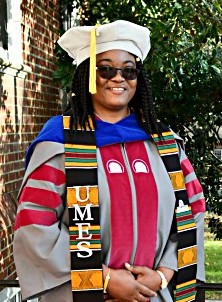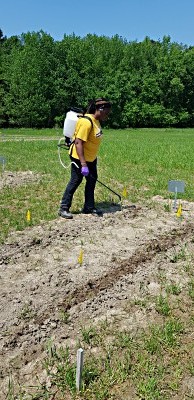
Informing Delmarva farmers and those across the nation about the best management practices of organic crop production is the intended outcome of newly minted Dr. Petrina McKenzie-Reynolds’ research toward her degree in food and agricultural sciences. The December 2020 doctoral graduate was involved in a three-year study at the University of Maryland Eastern Shore on food safety and soil health in organic specialty crop systems. Her work aimed to add credible research findings to the scientific database for current practices.
“Poultry manure is often used as an organic fertilizer largely because it is inexpensive, easily accessible and has a high nitrogen content. Consumer demand has increased for organically grown fresh produce, as it is associated with healthier eating practices. However, the use of manure amendments to soil for growing fresh produce is a food safety concern as they can harbor fecal pathogens that may result in foodborne illnesses,” McKenzie-Reynolds said.
“Dr. McKenzie-Reynolds’ study is the first of its kind to be conducted at UMES,” said Dr. Fawzy Hashem, an associate professor in the Department of Agriculture, Food and Resource Sciences and one of her advisers. “It is considered a pioneer study and its findings will help organic growers and decision-makers evaluate food safety considerations associated with wait-time intervals between the application of poultry manure on Delmarva cropland soils, biological amendments and produce harvest.”
McKenzie-Reynolds said the study revealed that generic E. coli populations may persist over time but within the time frame that will satisfy the regulations of the National Organic Program. These stipulations require a 120-day post-manure application wait period before harvesting for crops that are in indirect contact with the soil and 90 days for crops that are not in direct contact with the soil. Pathogens such as Listeria monocytgenes, Staphylococcus and Salmonella were not detected on the harvested produce during the study period.
Results, she said, also showed that the poultry manure application and cover crop combinations researched in field studies did in fact improve soil health.
“The evidence was seen in the physio-chemical comparison of the soil’s analysis from the plots after the amendment to that of the plots before amendments. Macro- and micronutrients important to plant growth and development, especially nitrogen and the cation-exchange capacity (the measure of how many charged atoms or molecules can be retained on soil particle surfaces), increased significantly,” she said. “Improvements were also noticeable in the soil’s biological and physical characteristics, including that of organic matter, particulate organic matter and potentially mineralizable nitrogen (the fraction of organic nitrogen converted to plant or mineral available form under specific conditions such as temperature, moisture and aeration) content. Water-stable aggregates important in water and nutrient transfer also increased.”
McKenzie-Reynolds would like to apply the knowledge and skills she has acquired at UMES in her native country, Jamaica, and in other developing countries “in a capacity that will enhance and create a balance for human and environmental health with that of food security and sustainability.” Following graduation, she intends to help implement various technologies within the food safety and soil health sector to mitigate and alleviate issues of concerns, especially in developing countries.
“I would like to advocate for small farmers in those countries to have access to subsidies and resources that will facilitate their equality in the food production market.” She said she would also like to be instrumental in creating more opportunities for young people entering the discipline to have international exposure to global trends and activities through school and work-travel internships.

McKenzie-Reynolds, who also holds a master’s degree in natural resources from Delaware State University, earned her doctoral dissertation on November 16. The title of her dissertation is, “Improving Soil Health and Food Safety in Organic Specialty Crop Systems by Customized Management of Biological Soil Amendments.” Her dissertation was directed by Drs. Lurline Marsh and Fawzy Hashem of UMES and Dr. Patricia Millner of the U.S. Department of Agriculture’s Agricultural Research Station in Beltsville, Maryland. UMES’ Drs. Salina Parveen and Arthur Allen served as committee members.
During the study, comparisons were made in the use of sub-surface manure application to band application and tillage and the inclusion of cantaloupes, cucumbers, spinach and radish in separate plots, McKenzie-Reynolds said. Assessments of soil microbial diversity and activity (soil respiration) across the treatments were made along with soil health assessments. Soils were amended with aged poultry litter, poultry compost and heat-treated poultry pellets. These amendments were incorporated with cover crops, such as forage radish and hairy vetch, and inoculated with non-pathogenic strains of generic E. coli. Cucumber and cantaloupe seeds were germinated in the greenhouse and then transplanted to their respective fields, while spinach and radish seeds were directly seeded into the field plots.
“Soil samples were taken along with the penetrometer readings before manure application to gain baseline information of the soil health prior to amendment. The irrigation water and poultry manure were also tested prior to application for any microbial contamination,” she said. Soil samples were taken on day one immediately after application followed by subsequent soil sampling at 30-day intervals up to day 150. These samples were then assayed for E. coli presence or absence. Produce samples were also assayed at 90 and 120 days for targeted pathogens (E. coli, Salmonella, Listeria monocytogenes and Staphylococcus aureus). Further, soil samples were analyzed at the end of the growing seasons for any improvement in soil health after amendments, she said.
“Results show that E. coli soil populations declined when ambient and soil temperatures declined,” McKenzie-Reynolds said. “The association between E. coli declines in soil and environmental temperatures may also coincide with seasonal patterns that also reflect changes in soil moisture. Assessments also include generating baseline information that will enhance knowledge for comparative data analysis.”
This study is funded by the USDA-NIFA-1980 Capacity Building Program, Accession number: 1012123 and by the UMES Agriculture Experiment Station.
Gail Stephens, agricultural communications and media associate, School of Agricultural and Natural Sciences, University of Maryland Eastern Shore, 410-621-3850, gcstephens@umes.edu.

